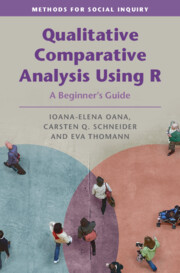Crossref Citations
This Book has been
cited by the following publications. This list is generated based on data provided by Crossref.
Nishida, Naoki
2021.
Varieties of Unionism? A Set-Theoretic Approach to Business, Labor and Unemployment Benefits Development.
SSRN Electronic Journal,
Swiatczak, Martyna Daria
2021.
Towards a neo-configurational theory of intrinsic motivation.
Motivation and Emotion,
Vol. 45,
Issue. 6,
p.
769.
Bazzan, Giulia
Álamos‐Concha, Priscilla
and
Rihoux, Benoît
2022.
Identifying diverse paths toward successful policy performance in Organization for Economic Co‐operation and Development (OECD) and European Union countries: A Qualitative Comparative Analysis (QCA) exploitation of the Sustainable Governance Indicators (SGI) data.
European Policy Analysis,
Vol. 8,
Issue. 2,
p.
178.
Medina-Molina, Cayetano
and
Pérez-Macías, Noemí
2022.
The Identification of Causal Mechanisms in Sustainable Urban Transitions—A Systematic Approach to Case Selection.
Mathematics,
Vol. 10,
Issue. 14,
p.
2438.
Mahoney, James
and
Acosta, Laura
2022.
A regularity theory of causality for the social sciences.
Quality & Quantity,
Vol. 56,
Issue. 4,
p.
1889.
Thomann, Eva
Ege, Jörn
and
Paustyan, Ekaterina
2022.
Approaches to Qualitative Comparative Analysis and good practices: A systematic review.
Swiss Political Science Review,
Vol. 28,
Issue. 3,
p.
557.
Mello, Patrick A.
2022.
Incentives and constraints: a configurational account of European involvement in the anti-Daesh coalition.
European Political Science Review,
Vol. 14,
Issue. 2,
p.
226.
Wagemann, Claudius
2022.
Handbuch Policy-Forschung.
p.
1.
Haesebrouck, Tim
and
Thomann, Eva
2022.
Introduction: Causation, inferences, and solution types in configurational comparative methods.
Quality & Quantity,
Vol. 56,
Issue. 4,
p.
1867.
Hornung, Johanna
2022.
Social identities in climate action.
Climate Action,
Vol. 1,
Issue. 1,
Mahoney, James
and
Owen, Andrew
2022.
Importing set-theoretic tools into quantitative research: the case of necessary and sufficient conditions.
Quality & Quantity,
Vol. 56,
Issue. 4,
p.
2001.
Medina-Molina, Cayetano
Rey-Tienda, María de la Sierra
and
Suárez-Redondo, Eva María
2022.
The Transition of Cities towards Innovations in Mobility: Searching for a Global Perspective.
International Journal of Environmental Research and Public Health,
Vol. 19,
Issue. 12,
p.
7197.
King, Seán
2022.
The contextual cogs of “migrant jobs”: A comparative study of the institutional determinants of migrant marginalization in European labor markets.
Frontiers in Political Science,
Vol. 4,
Issue. ,
Lauri, Triin
and
Saar, Ellu
2022.
Cumulative advantages and disadvantages in attainment of higher education: Set-analytic comparison of asymmetric inequalities in six European countries.
International Journal of Comparative Sociology,
Vol. 63,
Issue. 1-2,
p.
51.
Swiatczak, Martyna Daria
2022.
Different algorithms, different models.
Quality & Quantity,
Vol. 56,
Issue. 4,
p.
1913.
Ide, Tobias
and
Mello, Patrick A
2022.
QCA in International Relations: A Review of Strengths, Pitfalls, and Empirical Applications.
International Studies Review,
Vol. 24,
Issue. 1,
Baumgartner, Michael
2022.
Qualitative Comparative Analysis and robust sufficiency.
Quality & Quantity,
Vol. 56,
Issue. 4,
p.
1939.
Paustyan, Ekaterina
2023.
Media Review: Qualitative Comparative Analysis Using R: A Beginner’s Guide.
Journal of Mixed Methods Research,
Vol. 17,
Issue. 1,
p.
118.
Tan, Haibo
Li, Yanwei
Huang, Jiachen
and
Liu, Xiaozhou
2023.
Is it all about the government's early response? A configurational analysis of 27 cases in governing COVID‐19 in China.
Review of Policy Research,
Wagemann, Claudius
2023.
Handbuch Policy-Forschung.
p.
397.



